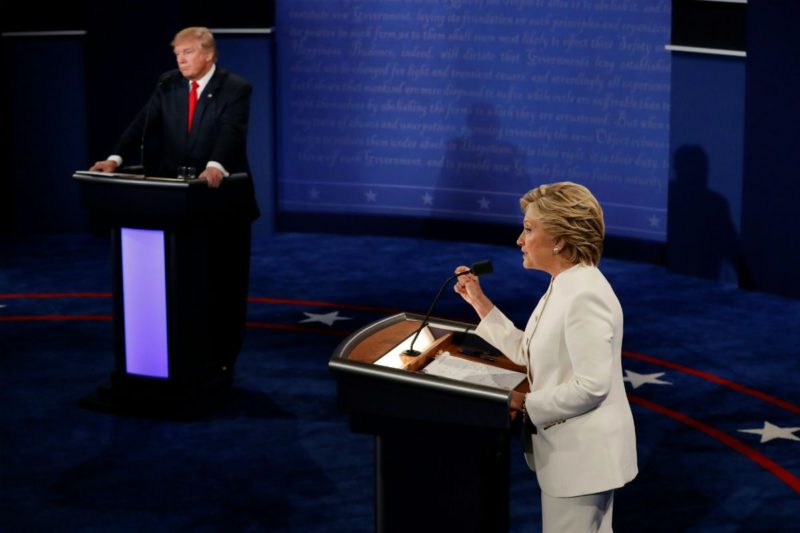Clinton Denounces Trump’s ‘Scare Rhetoric,’ Vows to Protect Abortion Rights
The “partial-birth abortion” procedure that debate moderator Chris Wallace referred to is an inflammatory and non-medical term created by the anti-choice National Right to Life Committee in hopes of making abortion restrictions easier to pass.

Democratic presidential nominee Hillary Clinton criticized the stigmatizing and misleading rhetoric used by Republican nominee Donald Trump in describing abortion when the topic came up during Wednesday night’s third and final presidential debate.
Trump, in a heated exchange between the candidates after a question from debate moderator and Fox News host Chris Wallace on “late-term, partial-birth abortions,” offered a graphic and misleading interpretation of what he seemingly believed that procedure would entail.
“If you go with what Hillary is saying, in the ninth month, you can take the baby and rip the baby out of the womb of the mother just prior to the birth of the baby,” Trump claimed.
He said that such abortions could happen “as late as one or two or three or four days prior to birth.”
Trump’s “scare rhetoric is just terribly unfortunate,” Clinton fired back. “You should meet with some of the women that I’ve met with, women I’ve known over the course of my life.”
“This is one of the worst possible choices that any woman and her family has to make. And I do not believe the government should be making it,” Clinton continued, seemingly referring to those who seek later abortion care.
The “partial-birth abortion” procedure that Wallace referred to is an inflammatory and non-medical term created by the anti-choice National Right to Life Committee in 1995 in the hopes of making abortion restrictions easier to pass. The U.S. Supreme Court upheld a law banning it in 2007, though the law doesn’t include a description of exactly what medical procedure it bans.
Though the mention of so-called partial-birth abortions veered the discussion toward later abortion care, in truth abortions late in a pregnancy are very rare. The U.S. Centers for Disease Control and Prevention says more than 90 percent of abortions take place within the first 13 weeks of a pregnancy, and 43 states have gestational restrictions on abortion care.
In her initial response to Wallace’s question, Clinton said she voted against a “partial-birth abortion” ban during her time as a U.S. senator because while Roe v. Wade “very clearly sets out that there can be regulations on abortion so long as the life and the health of the mother are taken into account,” in the case of the legislation in question, she “did not think that that was the case.”
Her answer also included a general defense of later abortion care, noting that it could be regulated as long as there were exceptions for life endangerment.
“The kinds of cases that fall at the end of pregnancy are often the most heartbreaking, painful decisions for families to make,” Clinton said. “I have met with women who toward the end of their pregnancy get the worst news one could get, that their health is in jeopardy if they continue to carry to term or that something terrible has happened or just been discovered about the pregnancy. I do not think the United States government should be stepping in and making those most personal of decisions.”
Clinton has said that she would allow some restrictions on later abortion care as long as they contain exceptions.
Last night’s debate in Las Vegas marked the first time this election cycle that a moderator asked about abortion rights during the presidential nominee debates. The topic was factored into a discussion of the U.S. Supreme Court and came after months of reproductive rights and justice advocates calling on debate moderators to ask the major party nominees about it.
“Mr. Trump, you’re pro-life. But I want to ask you specifically: Do you want the court, including the justices that you will name, to overturn Roe v. Wade,” Wallace asked, adding that the case “includes … a woman’s right to abortion.”
Trump replied that he would “be appointing pro-life judges,” but that ultimately “I would think that that will go back to the individual states.”
When Wallace pressed the Republican nominee to clarify whether he would like to see the landmark abortion rights case overturned, Trump continued to avoid a direct answer. “That’ll happen automatically, in my opinion, because I am putting pro-life justices on the court,” Trump said. “I will say this: It will go back to the states, and the states will then make a determination.”
When the conversation turned to Clinton, she took the opportunity to note that threats to Roe are hardly the only attack on reproductive rights.
“So many states are putting very stringent regulations on women that block them from exercising that choice to the extent that they are defunding Planned Parenthood, which, of course, provides all kinds of cancer screenings and other benefits for women in our country,” said Clinton, who vowed to “defend women’s rights to make their own health-care decisions.”
State legislators introduced 445 provisions to restrict abortion access during the first half of 2016, according to a July analysis from the Guttmacher Institute. Seventeen states had passed 46 new restrictions during that period.
On abortion rights, Clinton said, “We’ve come too far to have that turn back now.”
